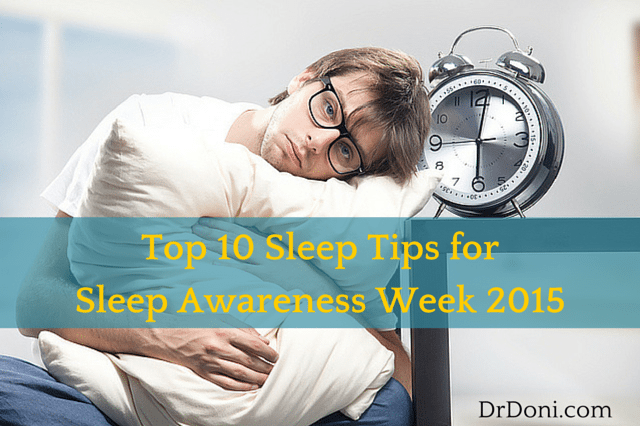Dr. Doni, author of The Stress Remedy, offers 10 simple tips for you to get a good night’s sleep.

Organizations like the National Sleep Foundation and others participate in a public education and awareness campaign to promote the importance of sleep. Each year, Sleep Awareness Week ends with the “spring ahead” clock change to Daylight Saving Time.
Since 2002, the National Sleep Foundation has been conducting a series of polls on a range of sleep-related topics, including exercise and sleep, sleep and again, and their “Bedroom Polls.” You can find the poll results here.
If you are a regular reader, you know that I just finished a 12-part Series on Sleep Disruptors and Insomnia, detailing all the factors that can rob you of a good night’s sleep—and what you can do about it. I invite you to take a look—and share it with your friends and family, too! The series page is here.
Simply put, good sleep is critical to your overall health and wellness. Chronic stress, spurred on by lack of sleep, and cortisol (the stress hormone) affect the four core systems—hormones, immune system, digestion, and nervous system. Research shows that when sleep is disrupted, cortisol levels are not optimal, throwing off your hormone levels and increasing inflammation. This creates a cycle that perpetuates sleep issues. Getting out of this cycle and getting into a pattern of good, sound, restful sleep is one of the best things you can do for your health.
Top 10 Sleep Tips
As a capstone to my Series on Sleep Disruptors and Insomnia, here are my top 10 tips to help you achieve a good night’s sleep for optimal health:
- Maintain a regular bedtime and wake schedule, including on weekends.
- Plan on going to sleep by 10 p.m. (or nine hours before you have to wake up) when melatonin levels are optimal for sleep.
- Use the hour before bed for less stimulating activities (turn off the TV, iPad, and other devices). If you have to be exposed to light at night, you can also use blue-light blocking glasses, such as these from Uvex and Sun Shield, or an app on your computer to block blue light.
- Make sure that your bedroom is completely dark because lights decrease melatonin, the hormone that helps you sleep. Also make sure that it is cool, clean, and quiet as well.
- Sleep on a comfortable and clean mattress, bedding, and pillows. Make sure your mattress is supportive and that it has not exceeded its life expectancy (usually about 10 years).
- Avoid sugar and large amounts of carbohydrates within 3 hours of bedtime, both of which can disrupt sleep.
- Support your body to lower your cortisol levels. For instance, Lavender can help lower your cortisol levels, which is what we all need for good sleep. Meditation, mindfulness, music, laughter, and yoga all also help lower cortisol levels when they are too high.
- Use an app such as “Sleep Cycle” to track your sleep and help you to identify wakefulness and sleep effectiveness. Then you can address any issues that you identify.
- Avoid caffeine, alcohol and nicotine, especially late in the day. Although some people think alcohol helps with sleep, it actually disrupts sleep and leads to more nighttime awakenings.
- Do not spend too much time awake in bed. If you are not sleeping, get out of bed and do something else for a while.
This list was originally published in my article called, “Sleep Your Way to Slim: 10 Ways to Improve Sleep for Wellness and Weight Loss,” on Huffington Post. You can find the complete article here.
If you are already implementing these 10 tips and you’re still not sleeping well, it may be time to seek out help with a naturopathic doctor. For exactly this reason, I designed a 6-month sleep solutions consultation package to help resolve issues with sleep.
This comprehensive program will help you identify the underlying cause of your sleep issues, and design a strategic plan to help you get restful sleep and restore your quality of life. Learn more about it here.
Plus with all this talk about sleep, I decided to write a whole book to help you with getting better sleep. Sign up to be notified when the book is ready here. When you sign up, you’ll receive a one-page PDF of sleep tips from me.
Thank you, as always, to my regular readers. I love hearing from you, and I appreciate your support and encouragement.
–Dr. Doni
6th March 2015, Updated February 2017
—
Photo credit: “Sad man holding pillow” by Vic is licensed under CC BY 2.0. Changed from original: Added text overlays.